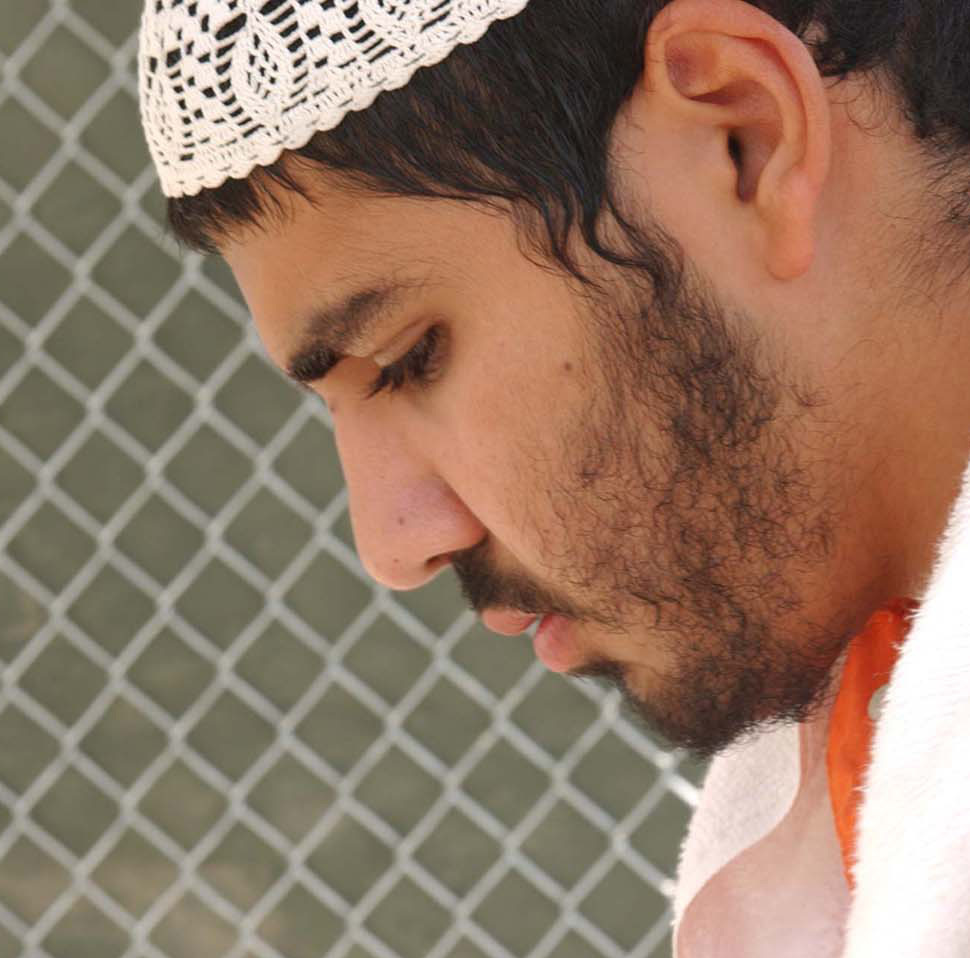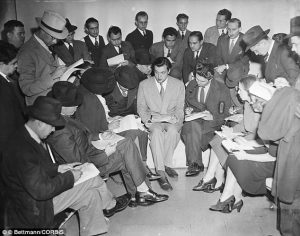Yaser Esam Hamdi, enemy? Having lived in Saudi Arabia for most of his life, Hamdi first encountered the U.S. military in 2001, when the U.S. invaded Afghanistan. As the United States mobilized for the War on Terrorism, Hamdi had naively affiliated himself with the Taliban resistance and prolonged presence in the battlefields, which led to his capture and detention in late 2001.1 As the years went on, the U.S. military declared Hamdi as an ‘unlawful combatant’, which left him to face inhumane treatment during his imprisonment in Guantanamo Bay.2 The treatment of prisoners of war is governed by one of the Geneva Conventions that recognizes the necessity of humanitarian protections for all prisoners during war times.3 Yet, Hamdi’s detainment, as an ‘unlawful combatant’ away from U.S. soil, enabled the U.S. Government to avoid following its own rules and violate the minimal protections that the Geneva Convention Relative to the Treatment of Prisoners of War should have afforded him. The location of Hamdi’s initial detention capitalized on this “legal black hole,” as Guantanamo Bay presented a unique case of leasing land on foreign soil, for which the traditional jurisdiction of the U.S. did not apply. Under the purpose of carrying out operations for the sake of the ‘security of the nation’, the U.S. acted with impunity in Guantanamo Bay and took full advantage of the opportunity to curtail human rights that this presented.4 Hamdi, born an American Citizen, saw his birthright protections denied not just as a Prisoner of war but as he should have been protected as an American.5 Categorizing Hamdi as an ‘unlawful combatant’ de facto removed all these rights and negated his American citizenship.

American troops captured Hamdi in the battlefields of Afghanistan, where Hamdi was fighting alongside the Taliban.6 After his capture, the U.S. military categorized the same way they did for all suspected terrorists. The U.S. Government determined underhandedly that Hamdi had not fought in accordance with the specifications of the Third Geneva Convention.7 The U.S. Military transported Hamdi to Guantanamo Bay Prison in Cuba for detention. There, Hamdi joined another 600 prisoners who had been “held indefinitely, without charges, without counsel, and without access to American Courts.”8 The treatment Hamdi received denied his humanity. Even once a report with contributing information from a visiting CIA analyst exposed openly the type of torture conducted in Guantanamo Bay, the American public sentiment did not change towards the prisoners because many Americans wanted to inflict punishment for the 9/11/2001 attacks (Hamdi had nothing to do with 9/11 but his arrest in Afghanistan was enough to deny his rights too).9 Americans and the Bush Administration held Afghanistan responsible for the Saudi Arabian Terrorists who executed the 9/11/2001 attacks. Therefore, many Americans simply assumed the government was correct in its handling of anyone categorized as ‘enemy combatants’.

However, once the U.S. government came to the realization that Hamdi was an American citizen since his Saudi Arabian mother gave birth to him in Louisiana, the Pentagon transferred him out of Guantanamo into a Virginian Brig, placed under their supervision. Even with the new information shedding light on how to advance such proceedings at the hands of the military, Hamdi did not receive the due process granted by the U.S. Constitution, by his birthright.10 Held in the Brig, with no access to counsel, Hamdi remained in the dark about the charges against him. The U.S. government declared secrecy for all proceedings was required for the sake of safety and security for the country.11 Could the U.S. Government deny a U.S. citizen, right to counsel and due process, as in the case of Hamdi, simply because it considered him an ‘unlawful combatant’? Did the U.S. government have the power to deny a citizen all his constitutional rights whenever determined as an enemy of the state? How far could the government go in calling citizens enemies of the state to effectively deny all the protections given by the U.S. Constitution? It went on for years for Hamdi.
Hamdi started fighting for his constitutional rights. He made repeated attempts to assert his rights. His first two petitions, combined into No. 02-6827, by Frank Dunham and Christian Peregrim were reversed and dismissed, as the Fourth Circuit Court deemed the two individuals ineligible, considering the lacking qualifications in their relations to the petitioner, as found in Hamdi v. Rumsfeld 294 F.3d 598 (2002).12 As the back and forth rulings of the District and Fourth Circuit Courts swung between the necessary precautions for the safety of the nation and the protection of an American individual’s rights, the intervention of the Supreme Court prove necessary.13
Eventually, Hamdi’s father, Esam Fouad Hamdi, joined as petitioner and helped to bring the case before the Supreme Court, with a writ of habeas corpus, No. 02-6895, which his father filed under the given code 28 U.S.C. § 2241, and it was accepted.14 Hamdi’s case was finally able to move forward with the third qualified petition, as the two previous petitions failed due to the lack of a substantial relationship necessary for filing.15 With the ultimate judicial power to determine the case of Hamdi, the precedent set by his case was momentous, for all those involved in the Middle East conflict and any other future conflicts that might befall on the U.S. in the future.16 Even if declared ‘unlawful combatants’, American prisoners can access the same rights and protections from the government, guaranteed in the Constitution for each citizen.17 This casebrought to the forefront the accessibility of habeas corpus.18

On June 28, 2004, the Supreme Court ruled in the favor of Hamdi in a 6-3 ruling, determining his entitlement to some protections granted by the rights like any other American, despite his ‘unlawful combatant’ status. The Supreme Court granted him habeas corpus but allowed his trial to be conducted as a military tribunal which did not afford him a jury of his peers.19 Thus, Hamdi’s case warranted a necessary judicial review so that the Executive cannot alone determine the entire case of a person who fit the same criteria as Hamdi. Justice Sandra Day O’Connor gave the plurality opinion of the court, highlighting the areas of concurrence among the justices, with multiple interpretations spanning the opinion.20
Despite all the judicial proceedings that had taken place for Hamdi’s case, in the end, Hamdi renounced his American citizenship. Given the opportunity to expatriate himself in exchange for his freedom or to remain an American citizen and stay in prison while undergoing a military trial, Hamdi chose to be exclusively a Saudi Arabian citizen. After Hamdi officially renounced his American Citizenship at the U.S. Embassy in Riyadh, Saudi Arabia, he was set free. Hamdi can no longer regain American citizenship because of the restrictions placed on him based on his alleged ties to the Taliban resistance when he was captured in 2001.21 The American citizen who most meaningfully impacted the rules of habeas corpus and the proceedings of the U.S. Military and the U.S. Government when categorized as ‘unlawful combatants’ ended up exchanging his American Citizenship and denied rights for his Saudi freedom instead. This case reaffirmed the true minimum human rights that should be afforded to all U.S. citizens regardless of their actions, the way the U.S. Constitution intended it.
- O’Connor, “HAMDI V. RUMSFELD,” Legal Information Institute (Legal Information Institute, June 28, 2004), https://www.law.cornell.edu/supct/html/03-6696.ZO.html). ↵
- Daniel E. Brannen Jr., Richard Clay Hanes and Rebecca Valentine, <em>Supreme Court Drama: Cases That Changed America</em>, (Detroit, MI, 2011), 694. ↵
- Geneva Convention relative to the Treatment of Prisoners of War, 75 U.N.T.S. 135, entered into force Oct. 21, 1950. ↵
- David C. Carlson, Cuba, (Detroit, MI: 2012), 441-445. ↵
- U.S. Constitution, amendment. I-XXVI, (Philadelphia, PA) entered into force September 25, 1789. ↵
- Encyclopedia of the Supreme Court of the United States, 2008, s.v. “Hamdi v. Rumsfeld, 542 U.S. 507 (2004),” by David Luban, 385. ↵
- International Committee of the Red Cross (ICRC), Geneva Convention Relative to the Treatment of Prisoners of War (Third Geneva Convention), 12 August 1949, 75 UNTS 135, 96-97. ↵
- International Encyclopedia of the Social Sciences, 2008, s.v. “Guantanamo Bay” 393. ↵
- The Encyclopedia of Middle East Wars: The United States in the Persian Gulf, Afghanistan, and Iraq Conflicts, 2010, s.v. “Guantanamo Bay Detainment Camp,” by Stephen A. Atkins. 502. ↵
- U.S. Constitution, art. 1, (Philadelphia, PA) entered into force September 25, 1789. ↵
- Encyclopedia of the Supreme Court of the United States, 2008, s.v. “Hamdi v. Rumsfeld, 542 U.S. 507 (2004),” by David Luban, 385-386. ↵
- United States Court of Appeals, “HAMDI v. RUMSFELD: 294 F.3d 598 (2002): 4f3d5981838,” Leagle (United States Court of Appeals, Fourth Circuit.https://leagle.com/images/logo.png), accessed March 31, 2020, https://www.leagle.com/decision/2002892294f3d5981838. ↵
- Daniel E. Brannen Jr., Richard Clay Hanes, and Rebecca Valentine, Supreme Court Drama: Cases That Changed America, (Detroit, MI, 2011), 694. ↵
- O’Connor, “HAMDI V. RUMSFELD,” Legal Information Institute (Legal Information Institute, June 28, 2004), https://www.law.cornell.edu/supct/html/03-6696.ZO.html. ↵
- Eastern District Court of Virginia, accessed March 31, 2020, http://www.vaed.uscourts.gov/notablecases/hamdi/chronology.html). ↵
- Daniel E. Brannen Jr., Richard Clay Hanes and Rebecca Valentine, Supreme Court Drama: Cases That Changed America, (Detroit, MI, 2011), 694. ↵
- U.S. Constitution, article 1, (Philadelphia, PA) entered into force September 25, 1789. ↵
- Oxford English Dictionary Online, s.v. ‘habeas corpus,’ accessed March 2, 2020, https://www.oed.com/view/Entry/82954?rskey=zreWpy&result=1&isAdvanced=false. ↵
- Daniel E. Brannen Jr., Richard Clay Hanes and Rebecca Valentine, Supreme Court Drama: Cases That Changed America, (Detroit, MI, 2011), 696. ↵
- Daniel E. Brannen Jr., Richard Clay Hanes, and Rebecca Valentine, Supreme Court Drama: Cases That Changed America, (Detroit, MI, 2011), 695. ↵
- Ben Herzog, Revoking Citizenship: Expatriation in America from the Colonial Era to the War on Terror, (New York, 2015), 116. ↵



33 comments
Savannah Alcazar
I had never heard of Yaser Esam Hamdi before reading this article. I found the introduction to grasp my attention. It is an interesting article, yet sad due to the conditions the paper is written about. It is weird to me that an American citizen could be fighting alongside the Taliban. Weird things happen in times of war; good read.
Eliane Castorena
This article is very interesting and sad at the same time. It is interesting to learn that Hamdi, although being an American citizen, was fighting alongside the Taliban. It is also very disappointing to read that he was denied his basic rights given to him by the United States Constitution by being an American citizen. He was sent to Guantanamo Bay, which is a horrible place for prisoners, because no law protects them from excessive torture. After going through all that, I can imagine why he decided to renounced his American citizenship.
Yuliana Vasquez
The U.S. was wrong in some ways but also right in some ways . Although they took a while to give him some rights, it was okay because he was still against the U.S. and was seen as an enemy , so he should have seen it coming. It was also wrong that did he did get treated inhumanely, because no one deserves to go through that.
Amanda Shoemaker
This is a very interesting article. There are so many different sides to Yaser Esam Hamdi’s case. The fact that he was an American citizen raised in Saudi Arabia most of his life and then made a war criminal against the states would make the case very difficult. The legal loophole of putting him in Guantanamo Bay so as to not have to treat them according to prison laws in the U.S. is horrible.
Margaret Cavazos
The case of Hamdi is a very unique one. It is difficult to imagine an American citizen being treated in this way, even once he was discovered to be a citizen, there were legal paperwork and restrictions that kept him from being treated in accordance with his rights. I had heard of the controversy of the Guantanamo Bay prison but did not quite understand until now when I realize it appears to be a loophole of sorts. The fact that Hamdi was not even told of the charges brought against him is frightening and although I understand it was the time surrounding the 9/11 terrorist attacks, he still deserved a fair trial.
Hali Garcia
I have heard of this case once, but I did not understand what had happened. Your article did a great job explaining the background of the case. Hamdi had a very interesting case because he was a United States citizen but he fought with the Taliban. When he was captured, the U.S. broke the rules of the Geneva Convention and his was treated as if he did not have rights even though he was a U.S. citizen. It struck me that even though the Supreme Court did give him some rights, he ended up renouncing his citizenship.
Berenice Alvarado
This article is informative. I had never heard of Yeser Esam Hamdi in my opinion yes he was a citizen because he was born here but in his heart he didn’t feel that way. It such a bad thing that his citizenship was taken from him but that way he didn’t have to live treated like an animal for the rest of his life. This article was shocking and crazy how the USA handles their “work”.
Yazmin Garcia
The Supreme Court definitely gave Hamdi quite the ultimatum. To keep his American status but stay in prison indefinitely or revoke his citizenship and be set free. He already aligned himself with the Taliban and with Saudi Arabia so giving up being an American citizen to be set free was a relatively easy choice. However, the United States should have honored the agreement according to the Geneva Convention. It is horrible to think about how others are being tortured during times of imprisonment.
Andres Ruiz
While I have never served in the armed forces, I have always heard horror stories of people of middle eastern decent being mistreated for helping the American armed forces. The inhumane treatment of these people who wish to serve is a mockery of the American Ideal, and I believe that those who help America in times of war should be rewarded. While there are understandable security concerns when dealing with locals in a foreign land, the commanding officer should be able to handle these security concerns in a way that doesn’t alienate the people who are helping us. Stories like this make me wonder how incompetent our Forces really are.
Nathaniel Bielawski
I think that Hamdi’s case is quite unique. He is a U.S. Citizen, but fought against the United States in the war on terror. In my opinion, if you go to war against the country you’re a citizen of, you essentially give up your citizenship and pledge allegiance to another country (in Hamdi’s case, the Taliban). I think the Supreme Court did the right thing by giving him some rights granted to him, but keeping him within the military tribunal system. After all, he was a U.S. citizen who wanted to kill other U.S. citizens in the military.